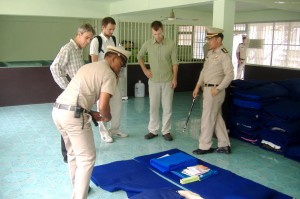
There are a small number of citizens of Nordic countries among some 16,000 foreign inmates in Thai prisons, according to Thailand’s Department of Corrections. As of August 2014, nine Swedes, four Danes, three Icelanders, three Norwegians and two Finns were being incarcerated pending trials or serving their sentences, said Manuch Sroypetch of Foreign Affairs sub-bureau, Department of Corrections.
“Generally speaking, inmates from Scandinavia and Finland are well behaved,” Manuch said.
Most of the Nordic citizens in Thai prisons were accused of or convicted for criminal offences, including possession of illicit drugs and credit card frauds. A few are standing trial for violent crimes, such as murder or sexual assault.
According to the Corrections Department’s latest statistics, there are about 300,000 inmates in 143 prisons throughout the country. Overcrowding is among problems that the Corrections Department has been struggling to contain.
Thai prisons use group confinement, no beds, inmates have access to mattress and not much space per person.
Lenient rules for family visits
Foreign inmates are treated no differently from their Thai counterparts.
“But for humanitarian reasons, foreign inmates may be allowed more generous family visitation as their families have to travel a long way at great expenses to see them,” Manuch said. In most cases, the family will be allowed to see the inmates in a private room that can receive 10 relatives under supervision of corrections officials.
“Family members may be allowed to see the inmate everyday during their stay in Thailand. Normally Thai inmates are allowed family visit once or twice a week.”
Inmates have access to library services, taped TV news – not up-to-date programming for security reasons. Letters are censored by prison officials. But inmates have the right to lodge complaints which must be sealed if those complaints are addressed to relevant authorities, such as Office of the Ombudsman or National Human Rights Commission of Thailand.
Transfer back home
Manuch Sroypetch explained that Nordic prisoners, like other foreign inmates, can look forward to being transferred back to their respective home countries after having served a minimum of one-third of their sentences in Thailand, or four years – whichever is the shorter.
Embassy officials from Nordic countries are in regular contact with Thai authorities in ensuring general wellbeing of their citizens and in safeguarding their rights to apply for transfer back to their home countries.
At present, there are no pending transfer requests from Nordic citizens in Thai prisons. Thailand’s Department of Corrections is keen on prisoner transfer because of language barrier that makes communication difficult. Besides, skill training on offer used as rehabilitative measure may not be relevant when inmates leave prison and go back to their home country.
Thailand has signed bilateral prisoner transfer treaties with Sweden, Denmark, Norway and Finland, along with 31 other countries. To date, 15 Swedes, three Danes, and one Norwegian have been repatriated to serve the remainder of their sentences in their countries of origin thanks to the prisoner transfer treaties.
Under the arrangement, a foreign inmate who qualifies for prisoner transfer has to first give consent, then the relevant authorities in the receiving country will be asked to decide whether to take the prisoner. Next, applications and supporting documents will be submitted to Thailand’s Committee for Consideration of the Transfer of Prisoners, chaired by the Permanent Secretary for Justice, which will decide whether to grant the prisoner transfer request.
In case in which a foreign prisoner is required to pay a fine, make restitution of property, or pay compensation for the cost of damages according to a Court’s judgement in a criminal case or according to the order of a competent authority, then the foreign prisoner shall be required to make full payment of the fine, restitution of the property, or compensation for the damages before the Committee shall issue the order approving the transfer.
Depending on the provisions of the governing treaty, prisoners who are convicted of certain types of crimes (an offense against the person of the Monarch, the Queen, or the Monarch’s son or daughter, an offense against national security from within the Kingdom or outside the Kingdom; or an offense against the laws governing national art treasures) or who have less than a year of time remaining on their sentences – are not eligible for transfer.
Requirement for prisoner transfer
The inmate has already served one-third of the sentence. For example, for a sentence of 9 years, the inmate can apply for transfer after having served three years.
But if the inmate was sentenced to 20 years in prison, he or she will be eligible for transfer request after having served 4 years. That is because the Legislation Procedure for Cooperation Between States in the Execution of Penal Sentences Act B.E. 2527 (1984) says the foreign prisoner must have served a minimum of one-third of period of imprisonment, or four years, whichever is the shorter.
The inmate must have more than one year left to serve in order to qualify.

